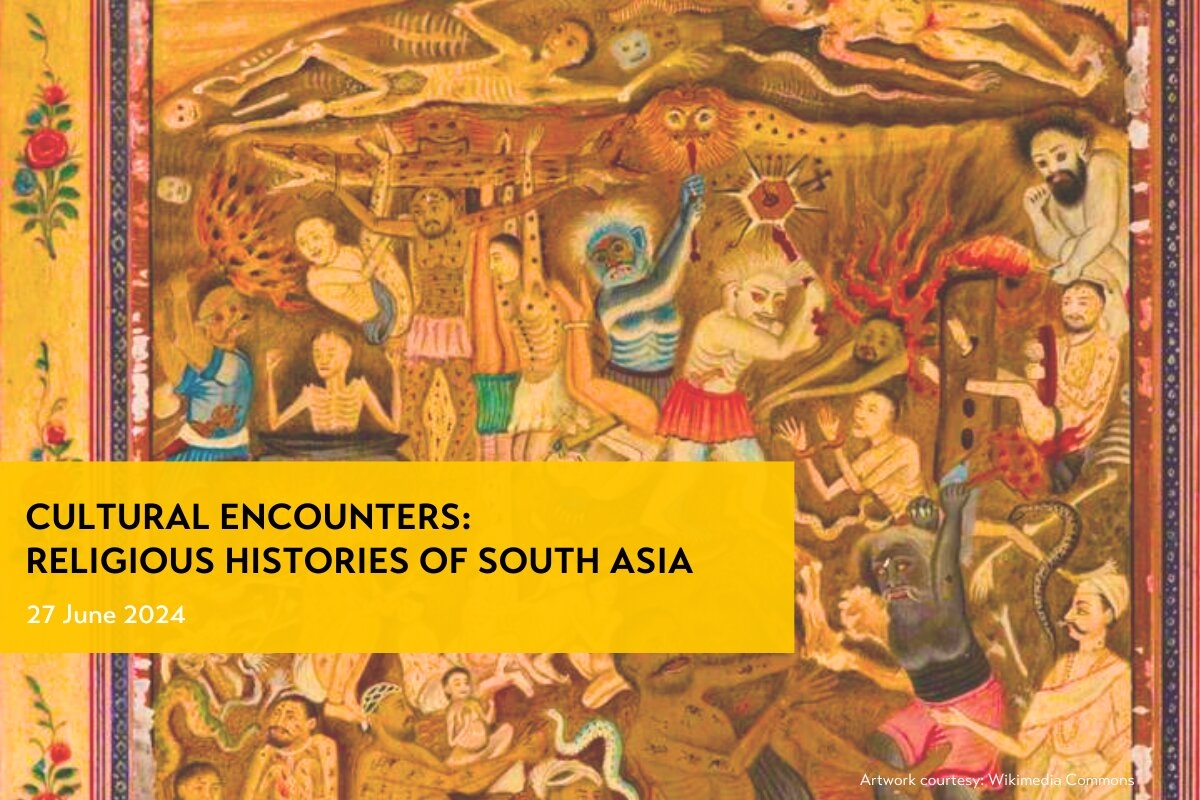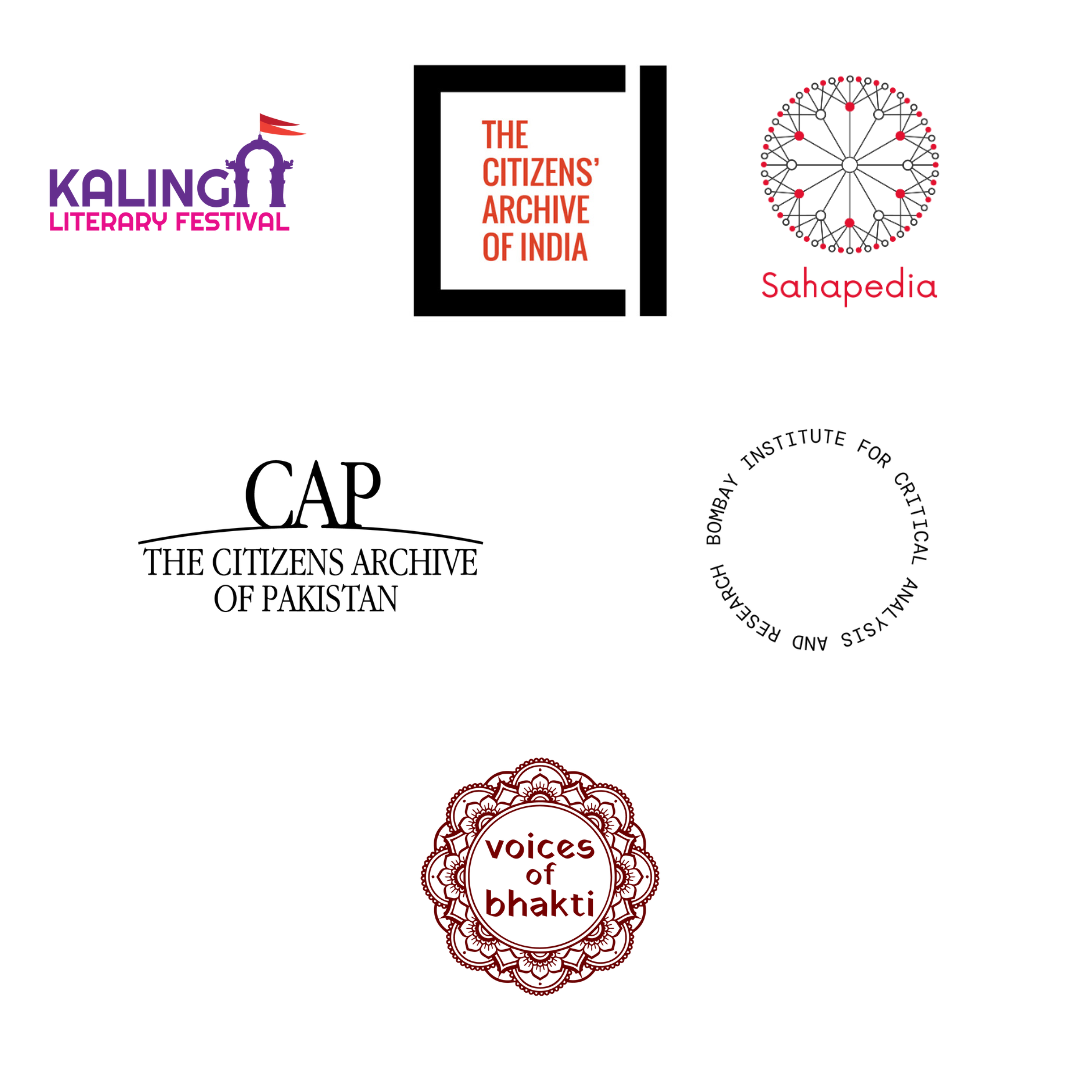Cultural Encounters: Religious Histories of South Asia
VIEW EVENT DETAILSThursday, 27 June 2024, 6:00 pm

In the eighteenth century, Governor-General Warren Hastings asked for a document compiling Hindu law for the British to better rule over the South Asian region. But unlike the suggestions of the ‘Code of Gentoo Laws,’ religion and religious practice in South Asia evades easy categorisation. Missionary Christianity, for example, took on local forms as Dalits converted to the religion. Islam has a unique history and character in present-day Pakistan, Bangladesh, India and Sri Lanka. Buddhism, once a response to the stifling societal norms of Hinduism in northern India, was spread far and wide, to present Nepal, Sri Lanka, and even south-east Asia. Sikhism and Jainism, also born in South Asia, each have their own set of paeans, codes, and histories, as does Zoroastrianism, which came to the western coast of India via Iran. Hinduism is not just one thing, one ‘Gentoo’ law: it changes across the vast, varied terrain of India. The religious movements of bhakti and Sufism took hold in South Asia too. From symbolism of the divine on Earth and cosmological understandings of why we are here and what we must do; to how to live life and how to materially exist in society, each religion brings its own understanding that forms what South Asia is today. Each religion has also left its imprint on the architecture, art, edifices, and material reality of everyday life in ways that involve overlaps between religion, culture, and identity: making it difficult, even impossible, to separate one religion from another neatly. So what does religion and pluralism in South Asia signify? How can we understand religious confluences, and how does one religion change or impact another?
This is the third session of Cultural Encounters: South Asian History in the 'Third Space,' this year's edition of our annual summer learning series, taking place virtually over June and July. Over four sessions and with panels of experts, we will explore the ways in which cultural similarities, hybridity, and interaction have shaped South Asia. The programmes focus on the colonial vs. local; food histories; religious histories; and histories of freedom. For more, visit this link.
SPEAKERS

Priyadarshini Sen is an independent journalist based in Delhi. She writes about religion, politics, culture, peace and social justice, and has reported across India, Asia, United States, Europe and North Africa. She's also mentored journalists through Pulitzer Center and East-West Center programs.

Eliza Kent is a Professor in Religious Studies at Skidmore, with affiliations with the Gender Studies Program, Asian Studies and Environmental Studies. She earned her Ph.D. from the University of Chicago Divinity School. Her two books -- Converting Women: Gender and Protestant Christianity in Colonial South India (Oxford University Press, 2004) and Sacred Groves, Local Gods: Religion and Environmentalism in South India (Oxford University Press, 2013) – both examine encounters across religious boundaries, a topic of enduring fascination for Eliza. With Tazim Kassam, she has co-edited a volume of essays entitled Lines in Water: Religious Boundaries in South Asia (Syracuse University Press, 2013). Whether engaged with gender or ecology, Eliza's research on religion in India focuses on religious pluralism and its side effects, such as conversion, syncretism, crypto-conversion, reform and revival. What happens when people come together across social divisions to envision new worlds and ways of being, and work together to bring those worlds into existence?
Haroon Khalid has an academic background in Anthropology. He got his undergraduate degree from Lahore University of Management Sciences (LUMS) in Social Sciences with a focus in anthropology and history, and graduate degree in Anthropology from The University of Toronto. He has been a freelance journalist since 2008 and has written over 350 articles, for numerous publications including Al Jazeera, CBC, MacLean’s, Scroll.in, Wire.in, TRT World, Himal, Dawn, The News, Express Tribune, and others. He has traveled extensively around Pakistan and has written about minority rights, folk traditions, politicization of history and heritage, nationalism and identity, and several other topics. Haroon is the author of five books – A White Trail (2013), In Search of Shiva (2015) Walking with Nanak (2016), Imagining Lahore (2018), and From Waris to Heer (2024). He has also written two short non-fiction books, The Enigma of Pakistani Identity (2017) and Beyond the Other (2016), and has contributed to several anthologies. In his work Haroon explores fluid identities, traditions and religious practices that challenge the notion of exclusivist identities that define communities in South Asia today. His writings have been translated into many languages including Punjabi, Urdu, Hindi, Bangla, Gujrati and Italian.
In addition to being a writer and journalist, Haroon is also an educator. He has taught Advanced Level Sociology, Philosophy and Theology, Global Perspectives and Research, and World History in various schools in Islamabad and Lahore. He worked as Minority Project Director at Citizens Archive of Pakistan for two years, and has been a consultant with UNESCO and World Wide Fund for Nature (WWF). He is currently based in Toronto, documenting oral histories of immigrants to Canada with his partner, Anam Zakaria, through the platform of their collective, Qissa, and working as Digital Communications Manager at Toronto Arts Council and Toronto Arts Foundation.
OUTREACH PARTNERS
